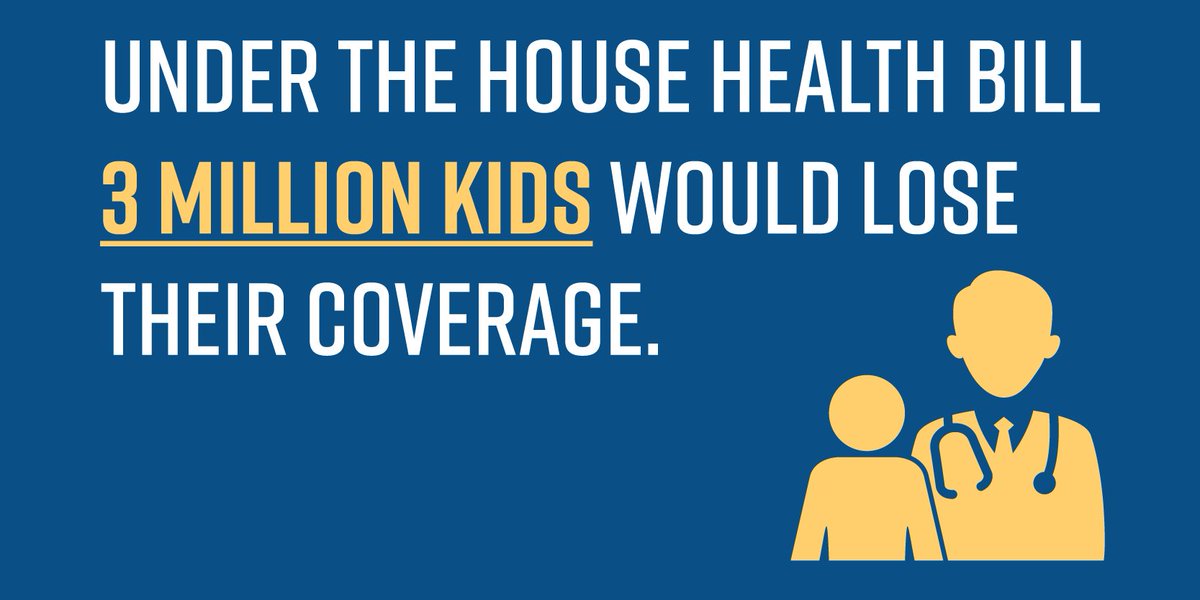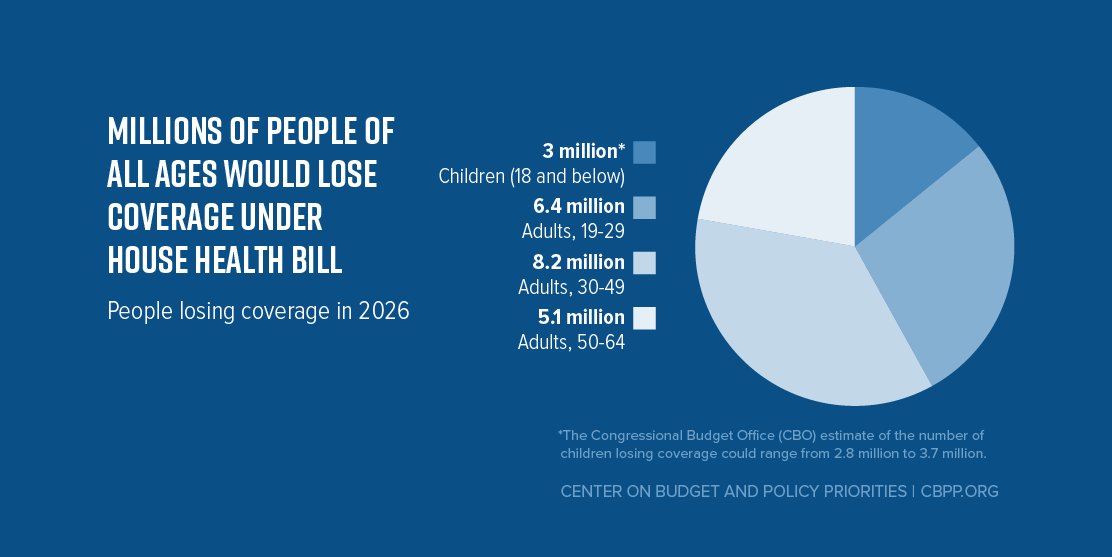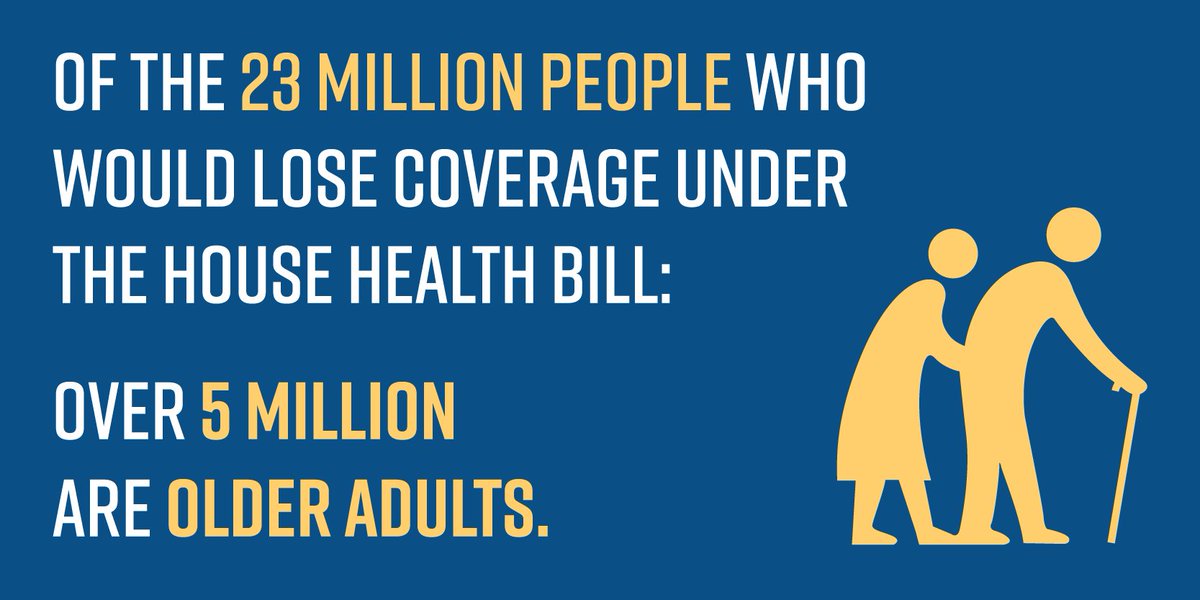The U.S. Senate will soon take up the Republican healthcare bill. Call it Trumpcare if you will. The current plan is that the text of the bill will only be announced next week and the Senate will vote on the bill a couple of days later. There will only be a limited debate. Senators will not have the ability to offer amendments.
The bill is expected to be similar to the bill passed earlier in the House of Representatives. That bill would have the effect of
increasing the number of uninsured Americans by 24 million. Health care premiums would go up dramatically for those who are older or who have preexisting conditions.


 Rumor has it that the Senate version of Trumpcare will include dramatic cuts in Medicaid
Rumor has it that the Senate version of Trumpcare will include dramatic cuts in Medicaid. Do not think that you would be unaffected by Medicaid cuts. Medicaid pays for most long term care. Most Americans don't have the resources to pay for nursing home care for themselves or their parents. You or your elderly relatives are likely to depend upon Medicaid at some point in your life -- assuming Medicaid will still be able to pay for this coverage.
It is not too early to start telling your Senators what you think about this bill and about the process that the Republican leadership is following. It will soon be too late.
It is especially important to contact Republican Senators. The Republican majority in the Senate is slim. They can only afford to lose two Senators.
Below is contact information for all Senators, sorted by state. Call, write, fax, e-mail. Do it now while you can.
If you are a government employee, you have every right to contact your Senator. Just don't do it from your office!
522 Hart Senate Office Building Washington DC 20510
(202) 224-6665
702 Hart Senate Office Building Washington DC 20510
(202) 224-3004
304 Russell Senate Office Building Washington DC 20510
(202) 224-5744
326 Russell Senate Office Building Washington DC 20510
(202) 224-4124
141 Hart Senate Office Building Washington DC 20510
(202) 224-4843
124 Russell Senate Office Building Washington DC 20510
(202) 224-2353
413 Russell Senate Office Building Washington DC 20510
(202) 224-4521
218 Russell Senate Office Building Washington DC 20510
(202) 224-2235
331 Hart Senate Office Building Washington DC 20510
(202) 224-3841
112 Hart Senate Office Building Washington DC 20510
(202) 224-3553
261 Russell Senate Office Building Washington DC 20510
(202) 224-5852
354 Russell Senate Office Building Washington DC 20510
(202) 224-5941
706 Hart Senate Office Building Washington DC 20510
(202) 224-2823
136 Hart Senate Office Building Washington DC 20510
(202) 224-4041
513 Hart Senate Office Building Washington DC 20510
(202) 224-2441
127A Russell Senate Office Building Washington DC 20510
(202) 224-5042
716 Hart Senate Office Building Washington DC 20510
(202) 224-5274
284 Russell Senate Office Building Washington DC 20510
(202) 224-3041
131 Russell Senate Office Building Washington DC 20510
(202) 224-3643
455 Russell Senate Office Building Washington DC 20510
(202) 224-3521
730 Hart Senate Office Building Washington DC 20510
(202) 224-6361
722 Hart Senate Office Building Washington DC 20510
(202) 224-3934
111 Russell Senate Office Building Washington DC 20510
(202) 224-3254
135 Hart Senate Office Building Washington DC 20510
(202) 224-3744
239 Dirksen Senate Office Building Washington DC 20510
(202) 224-6142
483 Russell Senate Office Building Washington DC 20510
(202) 224-2752
524 Hart Senate Office Building Washington DC 20510
(202) 224-2854
711 Hart Senate Office Building Washington DC 20510
(202) 224-2152
720 Hart Senate Office Building Washington DC 20510
(202) 224-4814
400 Russell Senate Office Building Washington DC
20510
(202) 224-5623
521 Dirksen Senate Office Building Washington DC 20510
(202) 224-6521
109 Hart Senate Office Building Washington DC 20510
(202) 224-4774
317 Russell Senate Office Building Washington DC 20510
(202) 224-2541
167 Russell Senate Office Building Washington DC 20510
(202) 224-4343
520 Hart Senate Office Building Washington DC 20510
(202) 224-5824
383 Russell Senate Office Building Washington DC 20510
(202) 224-4623
255 Dirksen Senate Office Building Washington DC 20510
(202) 224-2742
317 Hart Senate Office Building Washington DC 20510
(202) 224-4543
509 Hart Senate Office Building Washington DC 20510
(202) 224-4524
110 Hart Senate Office Building Washington DC 20510
(202) 224-4654
413 Dirksen Senate Office Building Washington DC 20510
(202) 224-2523
133 Hart Senate Office Building Washington DC 20510
(202) 224-5344
724 Hart Senate Office Building Washington DC 20510
(202) 224-6221
731 Hart Senate Office Building Washington DC 20510
(202) 224-4822
309 Hart Senate Office Building Washington DC 20510
(202) 224-5641
302 Hart Senate Office Building Washington DC 20510
(202) 224-3244
260 Russell Senate Office Building Washington DC 20510
(202) 224-5721
503 Hart Senate Office Building Washington DC 20510
(202) 224-6154
113 Dirksen Senate Office Building Washington DC 20510
(202) 224-5054
555 Dirksen Senate Office Building Washington DC 20510
(202) 224-6253
320 Hart Senate Office Building Washington DC 20510
(202) 224-2651
311 Hart Senate Office Building Washington DC 20510
(202) 224-2644
217 Russell Senate Office Building Washington DC 20510
(202) 224-3154
185 Dirksen Senate Office Building Washington DC 20510
(202) 224-6342
516 Hart Senate Office Building Washington DC 20510
(202) 224-2043
338 Russell Senate Office Building Washington DC 20510
(202) 224-2551
454 Russell Senate Office Building Washington DC 20510
(202) 224-6551
136 Russell Senate Office Building Washington DC 20510
(202) 224-4224
330 Hart Senate Office Building Washington DC 20510
(202) 224-3324
506 Hart Senate Office Building Washington DC 20510
(202) 224-2841
359 Dirksen Senate Office Building Washington DC 20510
(202) 224-3224
528 Hart Senate Office Building Washington DC 20510
(202) 224-4744
303 Hart Senate Office Building Washington DC 20510
(202) 224-5521
531 Hart Senate Office Building Washington DC 20510
(202) 224-6621
204 Russell Senate Office Building Washington DC 20510
(202) 224-3542
324 Hart Senate Office Building Washington DC 20510
(202) 224-6244
478 Russell Senate Office Building Washington DC 20510
(202) 224-4451
322 Hart Senate Office Building Washington DC 20510
(202) 224-6542
713 Hart Senate Office Building Washington DC 20510
(202) 224-2315
448 Russell Senate Office Building Washington DC 20510
(202) 224-3353
205 Russell Senate Office Building Washington DC 20510
(202) 224-4721
316 Hart Senate Office Building Washington DC 20510
(202) 224-5754
313 Hart Senate Office Building Washington DC 20510
(202) 224-3753
221 Dirksen Senate Office Building Washington DC 20510
(202) 224-5244
393 Russell Senate Office Building Washington DC 20510
(202) 224-6324
248 Russell Senate Office Building Washington DC 20510
(202) 224-4254
728 Hart Senate Office Building Washington DC 20510
(202) 224-4642
530 Hart Senate Office Building Washington DC 20510
(202) 224-2921
290 Russell Senate Office Building Washington DC 20510
(202) 224-5972
717 Hart Senate Office Building Washington DC 20510
(202) 224-6121
502 Hart Senate Office Building Washington DC 20510
(202) 224-5842
511 Dirksen Senate Office Building Washington DC 20510
(202) 224-2321
455 Dirksen Senate Office Building Washington DC 20510
(202) 224-4944
425 Dirksen Senate Office Building Washington DC 20510
(202) 224-3344
517 Hart Senate Office Building Washington DC 20510
(202) 224-2934
404 Russell Senate Office Building Washington DC 20510
(202) 224-5922
104 Hart Senate Office Building Washington DC 20510
(202) 224-5251
361A Russell Senate Office Building Washington DC 20510
(202) 224-5444
231 Russell Senate Office Building Washington DC 20510
(202) 224-4024
703 Hart Senate Office Building Washington DC 20510
(202) 224-2023
437 Russell Senate Office Building Washington DC 20510
(202) 224-4242
332 Dirksen Senate Office Building Washington DC 20510
(202) 224-5141
511 Hart Senate Office Building Washington DC 20510
(202) 224-3441
154 Russell Senate Office Building Washington DC 20510
(202) 224-2621
709 Hart Senate Office Building Washington DC 20510
(202) 224-5653
328 Hart Senate Office Building Washington DC 20510
(202) 224-5323
172 Russell Senate Office Building Washington DC 20510
(202) 224-6472
306 Hart Senate Office Building Washington DC 20510
(202) 224-3954
307 Dirksen Senate Office Building Washington DC 20510
(202) 224-6441
379A Russell Senate Office Building Washington DC 20510
(202) 224-3424



